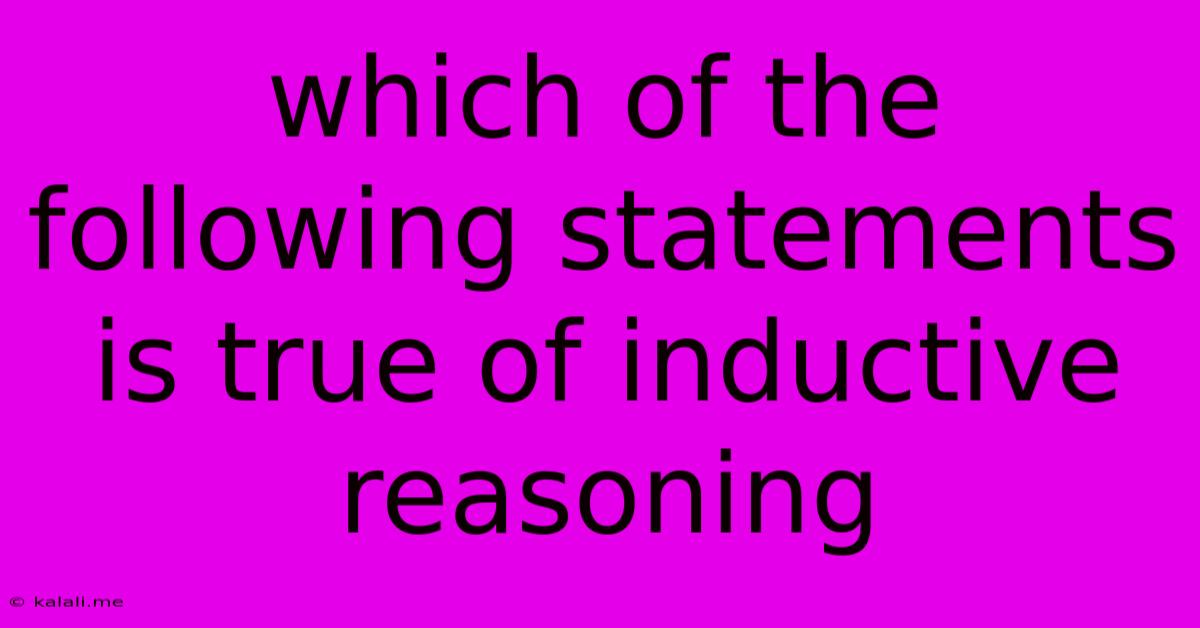Which Of The Following Statements Is True Of Inductive Reasoning
Kalali
Jun 13, 2025 · 3 min read

Table of Contents
Which of the Following Statements is True of Inductive Reasoning?
Inductive reasoning is a crucial aspect of critical thinking and problem-solving, forming the backbone of scientific inquiry and everyday decision-making. Understanding its characteristics is key to applying it effectively. This article will explore the nature of inductive reasoning and clarify which statements accurately reflect its properties. We'll delve into its strengths and limitations, highlighting why it's both powerful and potentially fallible.
What is Inductive Reasoning?
Inductive reasoning involves drawing general conclusions from specific observations. Unlike deductive reasoning, which moves from general principles to specific instances, inductive reasoning starts with specific data and moves towards a broader generalization. This process is often based on patterns, trends, and probabilities, rather than absolute certainty. A key characteristic is that the conclusion is probable but not necessarily certain.
Key Characteristics of Inductive Reasoning:
- Moves from specific to general: This is the defining feature. Observations of individual instances lead to a broader conclusion about the entire category.
- Conclusion is probable, not certain: Even with strong evidence, the conclusion remains a probability, not a guaranteed truth. New evidence could potentially contradict the conclusion.
- Based on observation and experience: Inductive reasoning relies heavily on empirical data and real-world examples.
- Strength depends on the evidence: The more evidence supporting the conclusion, the stronger the inductive argument becomes. However, there's always a possibility of encountering contradictory evidence in the future.
- Used in scientific inquiry and everyday life: Scientists use inductive reasoning to formulate hypotheses and theories based on experimental data. In daily life, we constantly make inductive inferences, such as predicting the weather based on past observations or judging a person's character based on their actions.
Common Types of Inductive Reasoning:
- Generalization: Drawing a general conclusion from a sample of observations. For example, "Every swan I have ever seen is white, therefore all swans are white." (Famous example showcasing the fallibility of inductive reasoning).
- Statistical induction: Using statistical data to support a conclusion. For example, "90% of people who smoke develop lung cancer; therefore, smoking significantly increases the risk of lung cancer."
- Analogical induction: Drawing a conclusion based on similarities between two or more things. For example, "My old car was reliable and this new car is similar, therefore this new car will likely be reliable."
- Causal inference: Inferring a causal relationship between events based on observed correlations. For example, "Every time I eat peanuts, I get a rash. Therefore, peanuts cause me to have a rash." Correlation doesn't always equal causation, however.
Statements about Inductive Reasoning: Which are True?
To answer the question posed in the title, we need specific statements to evaluate. However, based on the characteristics outlined above, here are some statements that would be true about inductive reasoning:
- Inductive reasoning leads to probable, not certain, conclusions. This is the core characteristic differentiating it from deductive reasoning.
- Inductive reasoning is a bottom-up approach to reasoning. It starts with specific data and moves toward broader generalizations.
- The strength of an inductive argument depends on the quality and quantity of evidence. More compelling evidence leads to a stronger conclusion.
- Inductive reasoning is frequently used in scientific research to formulate hypotheses. Scientists observe patterns and draw conclusions that they then test through further research.
Conversely, statements that would be false might include:
- Inductive reasoning guarantees true conclusions. This is incorrect; inductive conclusions are always probabilistic.
- Inductive reasoning is only used in formal settings like scientific labs. It's used extensively in daily life, too.
- Inductive reasoning is a purely mathematical process. While it might incorporate statistical analysis, it fundamentally relies on observation and interpretation of data.
Understanding the nuances of inductive reasoning allows us to critically evaluate arguments, make better decisions, and contribute effectively to discussions across various fields. By recognizing its limitations alongside its strengths, we can employ it as a powerful tool for understanding the world around us.
Latest Posts
Latest Posts
-
Is Density The Same As Mass
Jun 14, 2025
-
Which Trophic Level Has The Most Energy
Jun 14, 2025
-
How Many Milliliters Are In 1 Kiloliter
Jun 14, 2025
-
Shark Is To Fish As Dolphin Is To
Jun 14, 2025
-
The Relationship Between Celsius And Fahrenheit Is That
Jun 14, 2025
Related Post
Thank you for visiting our website which covers about Which Of The Following Statements Is True Of Inductive Reasoning . We hope the information provided has been useful to you. Feel free to contact us if you have any questions or need further assistance. See you next time and don't miss to bookmark.